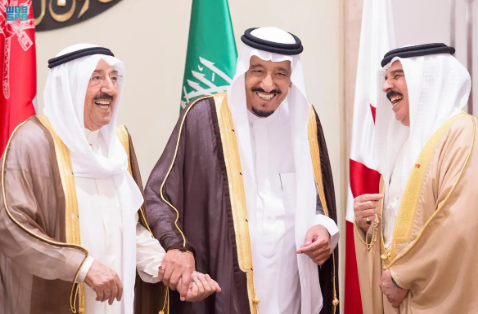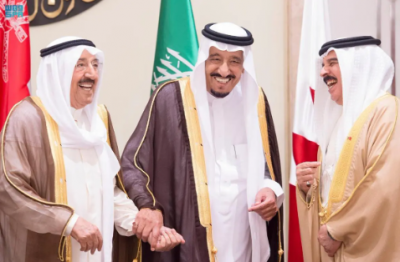The Gulf Cooperation Council (GCC) countries are connected by deep-rooted ties that stretch back into history, alongside profound religious, cultural, and familial bonds among their citizens. These factors foster closeness and unity, reinforced by the flat geographical expanse of the coastal desert environment that houses the populations of this region.
The GCC nations work within an integrated and harmonious framework for regional relations and international partnerships under the Council's umbrella, aiming to achieve greater accomplishments through collective Gulf action across various areas of cooperation and integration among member states.
To maintain consensus among GCC leaders on diverse issues discussed in their summits, the Supreme Council issued a decision during its 19th session in Abu Dhabi in 1998, mandating a semi-annual consultative meeting of the Council's leaders.
**First Consultative Meeting:**
The first consultative meeting took place in Jeddah on May 10, 1999, with the participation of all GCC countries. During this meeting, leaders addressed the reinforcement of fraternal relations among the GCC countries and reviewed the latest developments on Gulf, Arab, Islamic, and international arenas. This meeting was seen as a continuation of the efforts by the leaders to sensitize the needs of their citizens and monitor the implementation of decisions issued by the Supreme Council.
GCC leaders discussed their foremost interests regarding the Affairs of GCC countries, reaffirming their commitment to cooperation and solidarity.
**Second Consultative Meeting:**
On April 29, 2000, the second consultative meeting was held in Muscat, where GCC leaders expressed their pleasure with numerous bilateral visits, which impacted the GCC's journey through achieved economic and diplomatic agreements. They specifically agreed to facilitate the movement of GCC citizens using their national ID cards in most member states.
The leaders reviewed a report on the efforts of the trilateral committee from the GCC nations, tasked with finding a negotiation mechanism between the UAE and Iran concerning the dispute over the three islands (Greater Tunb, Lesser Tunb, and Abu Musa) claimed by the UAE. The leaders urged committee members to continue their efforts and expressed hope for a positive response from the Iranian government, affirming their commitment to establishing strong, trust-based relations with Iran.
**Third Consultative Meeting:**
On May 14, 2001, the third consultative meeting was held in Manama, where GCC leaders promoted topics of significance to the member states and discussed developments affecting the Arab and international arenas. They reiterated their support for the Palestinian people and called on the international community, especially the United States, to act to stop Israeli aggression and renew negotiations toward a just peace based on international legitimacy.
**Fourth Consultative Meeting:**
During the fourth consultative meeting in Jeddah on May 26, 2002, GCC leaders expressed their appreciation for Saudi Arabia's efforts regarding the Palestinian cause and their support for activating the Arab Peace Initiative. They emphasized their commitment to the initiative as a basis for any movement aimed at achieving a just and lasting peace under international legitimacy.
**Fifth Consultative Meeting:**
On May 21, 2003, the GCC held its fifth consultative meeting in Riyadh, where the Supreme Council reviewed the evolution of joint cooperation and accomplishments in various fields since its 23rd session. The Council reaffirmed its determination to enhance and advance the GCC's journey towards greater achievements in line with the aspirations of the citizens.
The Supreme Council firmly rejected all forms of extremism, violence, and terrorism while reviewing developments in the Middle East peace process, asserting the importance of international cooperation to implement the "Roadmap" toward peace and fully restore occupied Arab territories.
**Sixth Consultative Meeting:**
On May 16, 2004, the sixth consultative meeting took place in Jeddah, focusing on the challenges of terrorism and its threat to security and stability. The leaders condemned repeated terrorist attacks in Saudi Arabia that have claimed innocent civilian lives. They expressed dissatisfaction with the continued Israeli government's actions violating human rights.
**Seventh Consultative Meeting:**
The seventh meeting was held in Riyadh on May 28, 2005, where leaders discussed regional and international political issues, the Israeli-Palestinian conflict, developments in Iraq and Lebanon, as well as the occupation of the UAE's three islands by Iran. They reaffirmed the importance of combating terrorism through all means and called for effective international cooperation to eradicate this destructive phenomenon.
**Eighth Summit:**
The eighth consultative summit on May 6, 2006, in Riyadh focused on areas of shared cooperation and the situation in Palestine and Iraq, including the Iranian nuclear issue and the UAE's three islands.
**Ninth Consultative Meeting:**
On May 15, 2007, during the ninth meeting, leaders discussed the latest regional and international developments, especially concerning the peace process. They expressed their unwavering stance on the UAE's rights regarding the disputed islands and called for negotiations.
**Tenth Consultative Meeting:**
The tenth consultative meeting occurred on May 20, 2008, in Dammam, where leaders supported Qatar's efforts in mediating the Lebanese crisis and reaffirmed their rights regarding the three islands occupied by Iran. They committed to peaceful resolution principles and called for a Middle East free of all weapons of mass destruction.
**Eleventh Consultative Meeting:**
The eleventh meeting on May 5, 2009, in Riyadh, led to agreeing on establishing the Gulf Monetary Council's headquarters in Riyadh and advancing the railway network project among the GCC states.
**Twelfth Consultative Meeting:**
The twelfth consultative meeting took place on May 11, 2010, focusing again on political, economic, and security cooperation and addressing significant regional and international developments.
**Thirteenth Consultative Meeting:**
On May 10, 2011, leaders approved Jordan's request to join the GCC and extended similar invitations to Morocco, tasking the council with finalizing procedures for both nations' membership.
**Fourteenth Consultative Meeting:**
During the fourteenth consultative meeting in Riyadh on May 13, 2012, the leaders welcomed proposals for transitioning to a union stage, forming a specialized committee to assess this transition.
**Fifteenth Consultative Meeting:**
Following a call from King Salman bin Abdulaziz, the fifteenth meeting addressed Yemen's situation, supporting "Operation Decisive Storm."
**Sixteenth Consultative Meeting:**
On May 31, 2016, the sixteenth consultative meeting convened in Jeddah, reviewing the progress of enhancing GCC cooperation through the establishment of a high-level Economic and Developmental Affairs Authority.
**Seventeenth Consultative Meeting:**
On May 21, 2017, leaders met in Riyadh during a US-GCC summit, focusing on combatting terrorism and strengthening strategic cooperation.
The Kingdom of Saudi Arabia’s leadership continues to play a pivotal role in facilitating consultative meetings among GCC countries to foster dialogue on regional and international issues crucial for the interests of member states and their populations.




